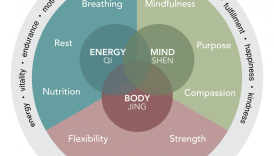Unveiling the Secrets of a Restful Night’s Sleep

Sleep is one of the most critical components of a healthy lifestyle, yet it is often overlooked in our fast-paced world. Many people experience restless nights, often leading to fatigue and decreased productivity during the day. It’s during those late hours that thoughts swirl, and comfort seems elusive. In this blog, we will explore:
- Unveiling the Secrets of a Restful Night’s Sleep
- Importance of Quality Sleep
- The Impact on Health
- Factors Affecting Sleep
- Biological Factors
- Environmental Factors
- Tips for Improving Sleep
- Creating a Relaxing Bedtime Routine
- Avoiding Stimulants Before Bed
- Sleep Disorders and Solutions
- Insomnia
- Sleep Apnea
- Benefits of a Good Night's Rest
- Physical Health
- Mental Well-being
- Impact of Technology on Sleep
- Blue Light Exposure
- Constant Connectivity
- The Role of Diet in Sleep Quality
- Foods That Promote Sleep
- Foods to Avoid
- Importance of Physical Activity for Better Sleep
- How Exercise Affects Sleep
- Best Practices for Exercising for Sleep
- Creating a Sleep-Friendly Environment
- Key Elements for a Sleep-Friendly Space
- Personal Touches
- Cognitive Behavioral Therapy for Insomnia
- What is CBT-I?
- Personal Experience
- Herbal Remedies for Sleep
- Popular Herbal Remedies
- Personal Anecdote
- Medical Treatments for Sleep Disorders
- Common Medical Interventions
- Personal Insight
- Conclusion
- Key Takeaways
- The importance of quality sleep and its effects on overall health.
- Factors that can disrupt sleep, both biological and environmental.
- Practical tips and strategies for improving sleep quality.
Join us as we dive into the world of sleep, uncovering its mysteries and equipping you with the tools to achieve a peaceful night’s rest.
Importance of Quality Sleep
Understanding why quality sleep matters can transform your daily life. It’s not just about feeling rested; sleep plays a crucial role in our physical and mental well-being.
The Impact on Health
When we invest in quality sleep, we reap numerous benefits:
- Enhanced Mood: A good night’s sleep supports emotional stability and reduces irritability.
- Cognitive Functioning: Sleep helps with memory consolidation and learning, sharpening our focus during the day.
- Physical Health: Proper sleep contributes to a stronger immune system and lower risks of chronic diseases.
Speaking from experience, after just one week of prioritizing sleep, I found my energy levels soared and my productivity improved significantly. Prioritizing sleep isn’t just a luxury; it’s essential for living a vibrant, healthy life.
Factors Affecting Sleep
While the importance of quality sleep is clear, understanding what affects it can lead to better nightly rest. Factors that disrupt sleep can be broadly categorized into biological and environmental influences.
Biological Factors
- Circadian Rhythms: Our body’s internal clock regulates sleep-wake cycles. Disrupting this rhythm, such as by working night shifts, can hinder sleep quality.
- Age: As individuals mature, sleep patterns often change. Older adults may find it harder to achieve deep sleep.
Environmental Factors
- Light Exposure: Bright screens from phones and computers can trick our brains into thinking it’s still daytime.
- Noise Levels: Sudden sounds, such as traffic or loud neighbors, can interrupt the sleep cycle.
I recall a time when my late-night binge-watching habits clashed with my sleep patterns. Reducing screen time and finding tranquility each night made a noticeable difference in how I felt when I woke up.
Tips for Improving Sleep
With an understanding of the factors affecting sleep, it’s time to explore actionable tips to enhance sleep quality. Creating a calming pre-sleep environment and habits can work wonders.
Creating a Relaxing Bedtime Routine
Establishing a consistent routine signals to your body that it’s time to wind down. Here’s how:
- Wind Down: Dedicate 30 minutes before bed for relaxation, such as reading or gentle stretching.
- Limit Screen Time: Aim to turn off devices at least an hour before bed, letting your mind shift away from the digital world.
Avoiding Stimulants Before Bed
Stimulants can significantly hinder your ability to fall asleep.
- Caffeine Cut-off: Avoid caffeine at least six hours before bedtime.
- Alcohol Awareness: Although alcohol may initially induce sleep, it often leads to disturbances later in the night.
In my own experience, embracing a soothing bedtime routine and cutting back on caffeine transformed my sleep from restless to restful, ensuring I wake up refreshed and ready for the day.
Sleep Disorders and Solutions
Despite our best efforts for better sleep, some may still struggle with sleep disorders. Two common conditions—insomnia and sleep apnea—can significantly affect daily functioning.
Insomnia
Insomnia is characterized by difficulty falling or staying asleep, leading to fatigue and irritability.
- Solutions:
- Cognitive Behavioral Therapy (CBT): A structured program can help identify and change sleep-disrupting behaviors.
- Sleep Hygiene: Maintain a regular sleep schedule and optimize your sleep environment.
Sleep Apnea
Sleep apnea involves repeated interruptions in breathing during sleep, often leading to snoring and frequent awakenings.
- Solutions:
- Continuous Positive Airway Pressure (CPAP): This device keeps airways open, improving sleep quality.
- Weight Management: Lifestyle changes, including weight loss, can greatly alleviate symptoms.
I remember a friend who battled insomnia for years. After trying CBT, they found the clarity and tools needed for significant improvement. Understanding these disorders allows individuals to seek the right solutions for restorative sleep.
Benefits of a Good Night’s Rest
Having explored the challenges that sleep disorders present, it’s crucial to highlight the myriad benefits of a good night’s rest. Quality sleep doesn’t just feel good; it enhances every facet of life.
Physical Health
- Quality sleep strengthens the immune system, reducing the likelihood of illnesses.
- It can help maintain a healthy weight by regulating hormones related to hunger.
Mental Well-being
A well-rested mind is more resilient.
- Improved mood and reduced anxiety are immediate advantages.
- Enhanced cognitive functions lead to better concentration and problem-solving skills.
Speaking from experience, after committing to consistent sleep patterns, I noticed not only an increase in energy but also a boost in overall happiness. Prioritizing sleep can truly be life-changing.
Impact of Technology on Sleep
As we have seen, good sleep offers numerous benefits, but technology can often play the villain in our quest for peace at night. The devices we love can disrupt our sleep patterns more than we realize.
Blue Light Exposure
- Screens and Sleep: Most screens emit blue light, which can interfere with the production of melatonin, the hormone that regulates sleep.
- Recommendations: Consider using blue light filters or special glasses to mitigate this effect.
Constant Connectivity
The addiction to notifications can lead to restless nights.
- Digital Detox: Setting boundaries around device usage, especially before bed, can significantly enhance sleep quality.
I learned this firsthand after limiting my screen time before bed; the difference was profound. Reducing technology’s grasp can pave the way for serene, restorative sleep.
The Role of Diet in Sleep Quality
Following our discussion on technology’s impact on sleep, let’s shift our focus to another often-overlooked factor: diet. What you eat plays a crucial role in determining how well you sleep.
Foods That Promote Sleep
Certain foods can help you wind down:
- Complex Carbohydrates: Foods like whole grains and oats can increase serotonin production.
- Magnesium-Rich Foods: Incorporate spinach, almonds, and bananas to promote muscle relaxation.
Foods to Avoid
On the flip side, some foods can keep you tossing and turning:
- Heavy Meals: Eating large, rich meals close to bedtime can lead to discomfort.
- Caffeine and Sugar: Both can disrupt your ability to fall asleep.
I vividly remember the nights I indulged in late-night snacks and suffered the consequences. A balanced diet not only fuels the body but nurtures a restful night’s sleep.
Importance of Physical Activity for Better Sleep
Building on our understanding of diet, let’s explore another key player in the sleep game: physical activity. Regular exercise not only benefits physical health but also significantly enhances sleep quality.
How Exercise Affects Sleep
- Reduces Stress: Physical activity releases endorphins, which can help alleviate stress and anxiety.
- Regulates Sleep Patterns: Engaging in regular aerobic exercise can lead to deeper sleep cycles.
Best Practices for Exercising for Sleep
- Timing Matters: Aim to complete vigorous workouts in the morning or early afternoon, as exercising too close to bedtime can keep you alert.
- Consistent Routine: Finding a time that works for you increases the likelihood of sticking with it.
Personally, I noticed a remarkable improvement in my sleep once I incorporated daily walks into my routine. A bit of physical activity can truly pave the way for a refreshing night’s rest.
Creating a Sleep-Friendly Environment
Having discussed the benefits of physical activity for sleep, let’s dive into another crucial aspect: the environment in which you sleep. Your bedroom’s setup can significantly impact the quality of your rest.
Key Elements for a Sleep-Friendly Space
- Temperature Control: A cooler room, around 60-67°F (15-19°C), is often optimal for sleep.
- Lighting: Block out any disruptive light with blackout curtains or a sleep mask.
- Noise Management: Consider earplugs or a white noise machine to create a tranquil atmosphere.
Personal Touches
Adding personal touches, such as soft bedding and calming colors, can enhance relaxation. I remember transforming my room with minimalist decor and a comfortable mattress—resulting in noticeably more restful nights. Creating a cozy, serene environment is essential for achieving the quality sleep we all crave.
Cognitive Behavioral Therapy for Insomnia
As we’ve explored enhancements to our sleep environment, let’s turn our focus to a powerful treatment option for those struggling with insomnia: Cognitive Behavioral Therapy for Insomnia (CBT-I). This evidence-based approach has been shown to effectively tackle the thoughts and behaviors that contribute to sleep disturbances.
What is CBT-I?
CBT-I is a structured program aimed at changing sleep-related beliefs and behaviors through various techniques.
- Sleep Restriction: This method involves limiting the time spent in bed to increase sleep drive.
- Cognitive Restructuring: It challenges and changes negative thoughts about sleep.
Personal Experience
I once struggled with persistent insomnia until I discovered CBT-I. By incorporating its strategies, I learned to manage my thoughts and establish healthier sleep habits, leading to improved rest quality. For anyone enduring sleepless nights, CBT-I can be a transformative solution worth considering.
Herbal Remedies for Sleep
Continuing our exploration of effective sleep solutions, let’s delve into herbal remedies that have stood the test of time in promoting restful sleep. Many people turn to these natural options to enhance their nightly rest.
Popular Herbal Remedies
- Chamomile: Often enjoyed as a tea, chamomile promotes relaxation and helps reduce anxiety.
- Valerian Root: Known for its sedative properties, valerian can improve sleep quality without the grogginess associated with some medications.
- Lavender: This fragrant herb can be used in essential oils or sachets to create a calming atmosphere.
Personal Anecdote
I remember a particularly stressful week when I struggled to unwind. After sipping chamomile tea each night before bed, I found the soothing effect helped me drift off more easily. Herbal remedies can be powerful allies in your quest for a peaceful night’s sleep.
Medical Treatments for Sleep Disorders
After discussing herbal remedies, it’s important to recognize that some individuals may require medical treatments for more severe sleep disorders. Consulting a healthcare professional can help determine the best course of action based on specific needs.
Common Medical Interventions
- Prescription Medications: Doctors may prescribe sleep aids like benzodiazepines or non-benzodiazepines for short-term relief.
- Continuous Positive Airway Pressure (CPAP): For those with sleep apnea, this machine helps keep airways open during sleep.
Personal Insight
A close friend of mine struggled with sleep apnea for years before seeking medical help. After starting CPAP therapy, he reported improved energy and diminished daytime fatigue. While natural remedies are valuable, sometimes professional medical treatments are necessary to reclaim restful sleep.
Conclusion
Having explored various aspects of sleep from environmental factors to medical treatments, it’s clear that achieving quality sleep is a multifaceted journey. Reflecting on personal experiences and practical strategies can empower anyone to improve their nightly rest.
Key Takeaways
- Prioritize Sleep Hygiene: Practicing good sleep habits and creating a calming environment can positively influence sleep quality.
- Explore Options: From herbal remedies to medical treatments, there are various avenues to consider for those facing sleep challenges.
Ultimately, understanding and addressing sleep needs is essential for overall health. Embracing these insights can lead to more restful nights and rejuvenated days. Sleep well—your body and mind will thank you!





